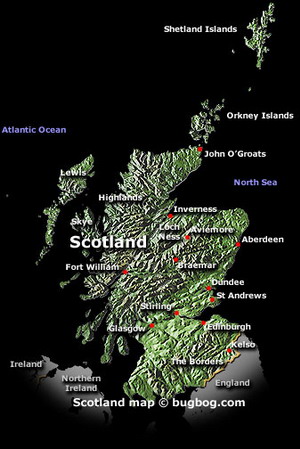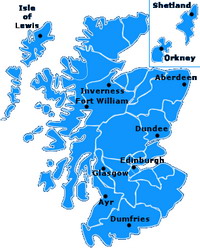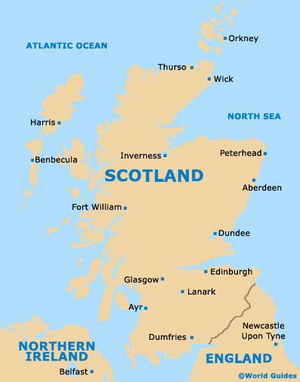1. Scotland
. '60,000 [pounds
sterling] cost of keeping an
addict on drugs
By Stephen McGinty
Extracts:
THE true cost of Scotland's drug habit has been set out by a leading academic,
who says a single addict sets the country back more than '60,000 [pounds
sterling] a year.
http://www.scotsman.com/news/60000-
cost-of-keeping-an.6186788.jp
Professor Neil McKeganey, director of the Centre for Drug Misuse Research at the
University of Glasgow, has criticised Scottish Government policy and said the
nation is "paying a massive price" for its drugs problem.
Scotland has some 55,000 addicts, so the annual bill in health care, criminal
activity, drug driving and other social costs comes to almost '3.5 billion
[pounds sterling] .
Writing in today's Scotsman, Prof McKeganey argues Scottish society has grown
too accepting of all forms of drug abuse and needs instead to preach a doctrine
of abstinence. He questions the Scottish Government's reliance on methadone as a
substitute for heroin abusers and argues more effort is required to get addicts
off drugs through abstinence.
Prof McKeganey says Scotland's drug problem is "virtually without equal anywhere
in Europe" and that concern over "legal high" mephedrone, a substance sold as
plant food which has become popular as a recreational drug and has been linked
to a number of deaths, is just another symptom of the "culture of addiction".
The Centre for Drug Misuse Research has estimated each problem drug user costs
'60,703 [pounds sterling] .a year, while a recreational drug user costs
the state only '134 [pounds sterling] ..
The costs were calculated by considering the addict's actions in terms of
health, work, driving, crime and other social consequences, such as children in
care and even addicts' deaths.
Prof McKeganey believes that key to tackling Scotland's drug problem lies in a
greater focus on abstinence. "If we are going to change the culture of
acceptance around drugs, we need to do something that is almost beyond
comprehension ' we need to normalise abstinence," he says.
2. South Africa: Was White Nationalist
Really a Left-Wing Pigeon'
Brit-Am Preliminary Comment:
The article
below suggest that a South African Afrikaans
White
Supremacist who was also anti-Jewish was in effect an agent of the left-wing
since his statements and antics mainly served to discredit and disgrace the
cause of people in South Africa whop otherwise have legitimate claims. We,
ourselves, do not think the person in question was really subjectively an agent
of pinky-winkies
but objectively he could have been, i.e. the consequences of his behavior were
the same as if he was.
See our article:
"Cracker True" by Yair
Davidiy
http://www.britam.org/kramer.html
The Legacy of Eugene
Terre'blanche
http://guywhite.wordpress.com/2010/04/04/the-
legacy-of-eugene-terre%e2%80%99blanche/
Extract:
De Klerk chose to do the dishonorable thing and give up any chance his people
stood for a job as a Deputy President.
And as part of the scheme, he needed a bad guy to show that he's the good
Afrikaner. Terre'Blanche played this role perfectly.
Some say he was duped to play this role. Others believe he knowingly
participated in order to harm the Afrikaner Right. In any event, the man is no
hero, just a tool of the Left to embarrass the opposition.
3. Helvetia (Switzerland) Takes on Libya.
The New Neutralism: US and
EU
Abandon Swiss In Conflict With Libya
http://www.brusselsjournal.com/node/4388
From the desk of Paul Belien
on Fri, 2010-04-09 05:52
March was a good month for Libyan dictator Muammar Gaddafi. He received
high-profile apologies from both the United States and the European Union. The
apologies were at the expense of Switzerland, the country against which Gaddafi
has officially declared 'holy war.' Switzerland has a tradition of neutralism in
international conflicts, but could not avoid a nasty conflict with Libya. Trying
to remain 'neutral' in the Swiss-Libyan conflict, the US and the EU grovel
before the Libyan despot.
The conflict between the Alpine republic and Libya began in July 2008, when
Hannibal Gaddafi, the then 31-year old son of the dictator Muammar Gaddafi,
savagely beat up two of his servants in the President Wilson Hotel in Geneva.
The Swiss police arrested Gaddafi jr.; he was released on bail after two nights
in a cell. In retaliation, Libya took two Swiss businessmen as hostages,
imprisoning them for 'visa violations.'
Switzerland soon dropped the charges against Gaddafi's son, but Libya kept the
businessmen under house arrest. One year later, in August 2009, Swiss President
Hans-Rudolf Merz traveled to Tripoli. To secure the release of the hostages, he
apologized to Gaddafi for the brief detention of his son. Gaddafi released one
of the hostages, the Muslim Swiss citizen Rachid Hamdani, but refused to accept
the Swiss apologies. Libya kept the other businessman, the ethnic Swiss Max G'di,
in prison.
The November 2009 referendum, in which 57.5% of the Swiss voters approved a ban
on the construction of new minarets in Switzerland, made Libya even angrier.
Libya announced a boycott of Switzerland, and called for the dissolution of the
country. On February 24, 2010, Gaddafi declared jihad against the 'faithless'
Swiss.
In an attempt to downplay the terrible implications of Gaddafi's appeal for
unlimited violence against Switzerland, US State Department spokesman Philip
Crowley said that the call for jihad against Switzerland was 'lots of words '
and not necessarily a lot of sense.' Instead of defusing the situation with his
'joke,' Crowley made matters even worse. Gaddafi took the comment as a personal
insult and threatened that there would be 'negative repercussions' for American
oil companies in Libya. On March 10, both Crowley and the American government
offered their apologies to the Libyan dictator. He accepted them, and said that
Tripoli would resume relations with Washington 'in a manner of mutual respect.'
The unfortunate Max G'di, meanwhile, has been moved to a damp, smelly windowless
cell in the wing of a Tripoli jail where he is imprisoned with 90 of the most
dangerous criminals of Libya.
Last November, following Gaddafi's call for the dissolution of Switzerland, Bern
drew up a blacklist of 188 extremist Libyans, including Gaddafi and his son, who
would 'for reasons of public and national security' no longer be allowed to
enter Switzerland. Since Switzerland is a member of the so-called Schengen zone
' the borderless travel zone grouping the EU countries (minus Britain and
Ireland), plus Switzerland, Norway and Iceland ' a Swiss ban also affects all
the other Schengen zone countries. The terms of the Schengen agreement oblige
all members to refuse visas to citizens of third countries blacklisted by fellow
Schengen group nations.
In retaliation for the Swiss blacklist, Libya stopped issuing visa to citizens
of all Schengen member states. Instead of backing the Swiss, as they are obliged
to do under the Schengen treaty, the EU countries threatened to expel
Switzerland from the Schengen zone unless it drop the blacklist against the 188
Libyans.
In late March, the Swiss gave in to EU pressure. Tripoli hailed the decision as
a victory over Switzerland. The Swiss feel snubbed by the EU. Miguel Angel
Moratinos, the Foreign Minister of Spain ' which currently holds the EU
presidency ' flew to Libya to apologize on behalf of the EU for the imposition
of the travel ban. 'We regret and deplore the trouble and inconvenience caused
to those Libyan citizens. We hope that this move will not be repeated in the
future,' he told Gaddafi.
Mr. Moratinos was joined by Italian Prime Minister Silvio Berlusconi. Of all the
EU countries Italy has the closest ties to Libya and had been pushing hard for
the expulsion of Switzerland from the Schengen group if Bern did not repeal the
blacklist.
The EU apology to Libya has reinforced anti-EU feelings in Switzerland, even in
traditionally pro-EU circles. Swiss parliamentarian Mario Fehr, a
Social-Democrat, called it 'a regrettable collective gesture of boot licking.'
The Tribune de Gen'e newspaper wrote that 'the EU caved in shamefully.' The
Zurich-based Tages-Anzeiger wrote that the EU bears a huge responsibility. 'This
conflict is more than a row over the fate of a Swiss hostage.'
Meanwhile, Gaddafi's son continues to cause mayhem wherever he goes. Two weeks
ago, a photographer waiting for Gaddafi at a nightclub in Istanbul was attacked
by the Libyan's bodyguards. Last December, British police had to intervene at
Claridge's, one of London's top hotels, when Hannibal Gaddafi hit his 29-year
old wife, a former model, in the face and broke her nose. The British police did
not arrest him, however, but allowed him to go to the Libyan embassy. In 2005,
Hannibal Gaddafi had been arrested in France after beating his pregnant
girlfriend at a Paris hotel. He was later given a four-month suspended prison
sentence for the assault.
See also:
Switzerland as the New Israel by Diana West
http://www.dianawest.net/Home/tabid/36/EntryId/1353/Switzerland-as-the-New-Israel.aspx
Previous Issues

Pleased with what you read'
Did you benefit from it'
We do this because we have a duty to do so and we believe in it.
Our understandings is that,
They who Help Brit-Am will be blessed.
Brit-Am depends on contributions alongside purchases of our publications
Click Here to make an offering.
Click Here to view our publications.
|
'It is impossible to rightly govern the
world
without God or the Bible'
George Washington
Brit-Am is the "still small voice" that contains the truth.
[1-Kings 19:12] AND AFTER THE EARTHQUAKE A FIRE; BUT THE LORD WAS NOT IN THE
FIRE: AND AFTER THE FIRE A STILL SMALL VOICE.





